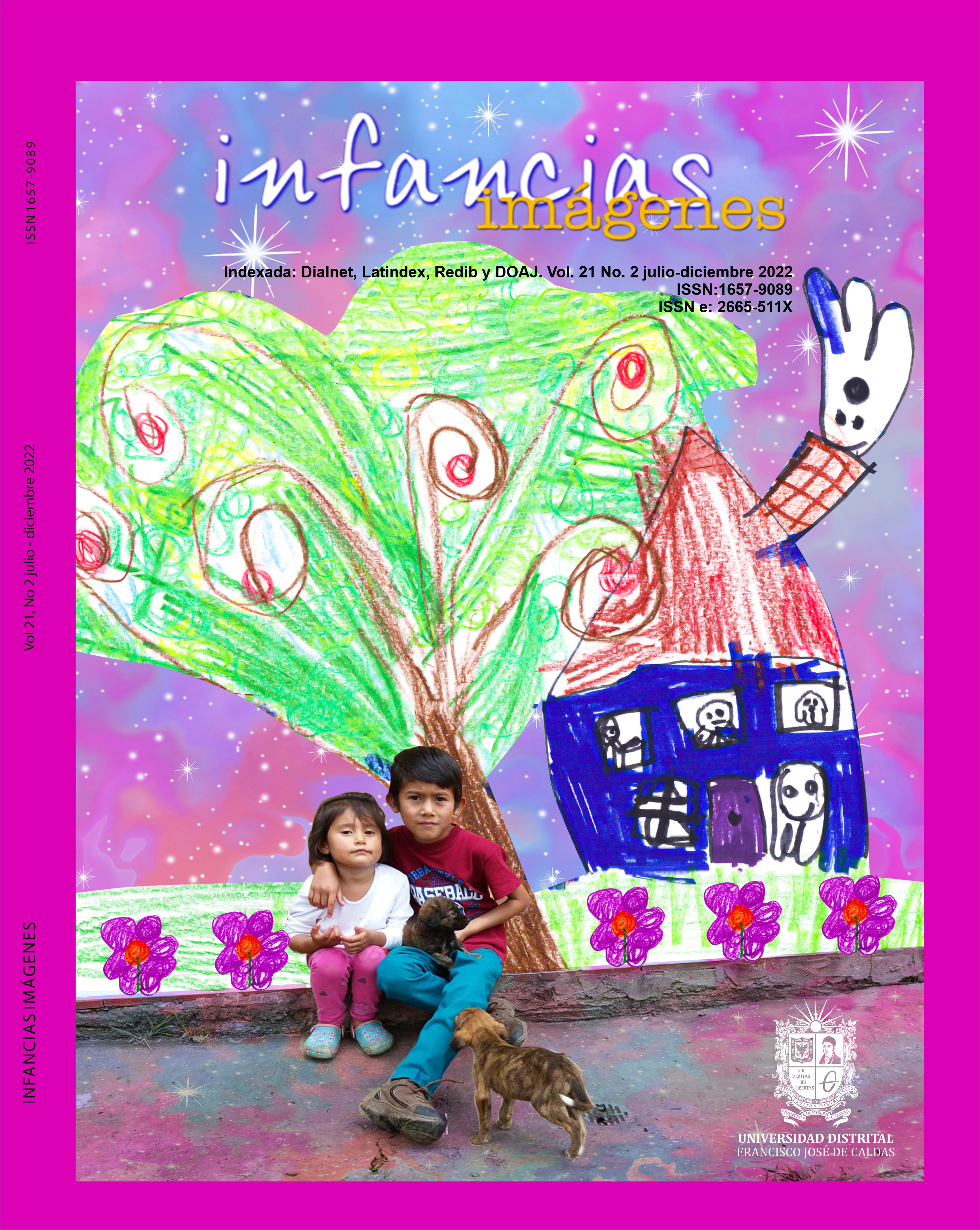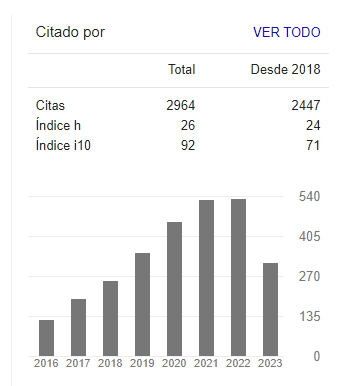DOI:
https://doi.org/10.14483/16579089.20800Published:
2023-04-27Issue:
Vol. 21 No. 2 (2022): julio-diciembreSection:
Imágenes de InvestigaciónLa evaluación motivacional en una experiencia de trabajo colaborativa con escolares
Motivational evaluation in a collaborative work experience with schoolchildren
Keywords:
motivación intrínseca, niños de escuela, colaboración (es).Downloads
Abstract (es)
Se presenta un diálogo entre la perspectiva motivacional y socio-cultural vinculada a una intervención colaborativa en una escuela pública de Montevideo (Uruguay). Participaron 22 escolares, su maestra y la directora del centro. Se obtuvo información proveniente de diferentes fuentes, la Escala de Orientación Intrínseca vs. Extrínseca en el Salón de Clases, las observaciones participantes de las actividades con los niños y niñas, las entrevistas con maestra y directora. Posteriormente se desarrollaron estrategias de abordaje específicas para fortalecer la motivación intrínseca de aquellos niños y niñas motivados extrínsecamente. La comparación grupal antes y después, constató un cambio de la orientación intrínseca a la extrínseca en todas las dimensiones motivacionales. Sin embargo, se observó un incremento significativo de la motivación intrínseca en los niños y niñas que participaron de la intervención específicamente en la dimensión Curiosidad. Estos resultados son alentadores para pensar en propuestas que integren una perspectiva motivacional.
Abstract (en)
A dialogue between the motivational and socio-cultural perspective linked to a collaborative intervention in a public school in Montevideo (Uruguay) is presented. 22 children, their teacher and the director of the center participated. Information from different sources was surveyed, the Scale of Intrinsic Versus Extrinsic Orientation in the Classroom, the participant observations of the activities with the boys and girls, the interviews with the teacher and the director. Subsequently, specific approach strategies were developed to strengthen the intrinsic motivation of those extrinsically motivated children. The group comparison before and after confirmed a change from intrinsic to extrinsic orientation in all motivational dimensions. However, a significant increase in intrinsic motivation was observed in the boys and girls who participated in the intervention, specifically in the Curiosity dimension. These results are encouraging to think about proposals that integrate a motivational perspective.
References
Ainscow, M. y Miles, S. (2008). Making Education for All inclusive. Where next? Prospects, 37(1), 15-34. https://doi.org/10.1007/s11125-008-9055-0
Ames, C. (1992). Classrooms: goals, structures and student motivation. Journal of Educational Psychology, 84, 261-271. https://doi.org/10.1037/0022-0663.84.3.261
Arocena, R. (2014). La investigación universitaria en la democratización del conocimiento. Revista Iberoamericana de Ciencia, Tecnología y Sociedad, 9(27), 85-102. https://bit.ly/3ruo9TT
Bruner, J. (1990). Actos de significado. Más allá de la revolución cognitiva. Madrid: Alianza Editorial 2000.
Bruner, J. (1997). La educación, puerta de la cultura. Aprendizaje Visor.
Cerasoli, C. P., Nicklin, J. M., and, Ford, M. T. (2014). Intrinsic motivation and extrinsic incentives jointly predict performance: A 40-year meta-analysis. Psychological Bulletin, 140(4), 980 - 1008. https://bit.ly/31t6Qrv
Cole, M. (1996). Cultural psychology: A once and future discipline. Cambridge: Harvard University Press.
Corpus, J. H., McClintic-Gilbert, M. S., and, Hayenga, A. O. (2009). Within-year changes in children’s intrinsic and extrinsic motivational orientations: Contextual predictors and academic outcomes. Contemporary Educational Psychology, 34(2), 154-166. https://doi.org/10.1016/j.cedpsych.2009.01.001
Cuevasanta, D., Curione, K., Ortuño, V., Sandin, F., Burghi, M. y Vásquez, A. (en prensa). Validación de la Escala de Orientación Intrínseca Versus Extrínseca en el Aula para escolares uruguayos, Revista Argentina de Ciencias del Comportamiento.
Da Silva, M. (2021). Narrativas digitales colaborativas para la creación de encuentros interculturales en una Escuela Pública en Montevideo. Modulema. Revista Científica sobre diversidad cultural, 5, 20-30. https://doi.org/10.30827/modulema.v5i0.17992
Decreto 158/019 del Poder Ejecutivo. Proyecto elaborado por la Comisión Nacional de Ética en Investigación, vinculada a la Dirección General de la Salud del MSP, relativo a la investigación en seres humanos. 12 de junio de 2019. https://bit.ly/31nfEPL
Duk, C. y Murillo, J. (2011). Aulas, escuelas y sistemas educativos inclusivos: la necesidad de una mirada sistémica. Revista Latinoamericana de Educación Inclusiva, 5(2), 11-12. https://bit.ly/3ExYddq
Freire, P. (1997). Pedagogía de la autonomía. Saberes necesarios para la práctica educativa. Siglo XXI.
Gottfried, A. E. (1990). Academic intrinsic motivation in young elementary school children. Journal of Educational Psychology, 82(3), 525–538. https://doi.org/10.1037/0022-0663.82.3.525
Gros, B. (2005). El aprendizaje colaborativo a través de la red: límites y posibilidades. Universidad de Barcelona.
Haraway, D. (1991-1995). Ciencia, cyborgs y mujeres. La reinvención de la naturaleza. Cátedra.
Harter, S. (1978). Effectance motivation reconsidered. Toward a developmental model. Human Development, 21, 34-64. https://psycnet.apa.org/record/1979-05631-001
Harter, S. (1980). A scale of intrinsic versus extrinsic orientation in the classroom: Manual, University of Denver Press, Denver, CO. https://bit.ly/3pm6uLf
Harter, S. (1981). A New Self-Report Scale of Intrinsic Versus Extrinsic Orientation in the Classroom: Motivational and Informational Components. Developmental Psychology, 17(3), 300-312. doi:10.1037/0012-1649.17.3.300
Harter, S. (2001). Influencias del maestro y los compañeros de clase sobre la motivación académica, autoestima y nivel de voz en los adolescentes. En Wentzel, K. R. &, Juvonen, J. (Eds.), Motivación y adaptación escolar: factores sociales que intervienen pp.13- 50. Oxford University Press.
Harter, S. y B. J. Jackson, (1992). Trait vs. non trait conceptualizations of intrinsic/extrinsic motivational orientation. Motivation and Emotion, 16, 209-230. https://doi.org/10.1007/BF00991652
Harter, S., Rumbaugh, N. and Kowalski, P. (1992). Individual differences in the effects of educational transitions on young adolescent´s perceptions of competence and motivational orientation. American Educational Research Journal, 29(4), 777-807. https://bit.ly/3DnroP0
Kaplan, A. &, Patrick, H. (2016). Learning environments and motivation. En Wentzel, K.R. y Miele, D.B. (Eds.), Handbook of Motivation at School pp. 251–275. Routledge. https://bit.ly/3GchgdT
Lalueza, J. L., Crespo, I., and, Luque, M. J. (2009). El projecte Shere Rom: espais educatius d’ús de les noves tecnologies per al desenvolupament comunitari. Barcelona Societat, 14, 129-36. https://bit.ly/3lwVLww
Lepper, M., Corpus, J. H., and, Iyengar, S. (2005). Intrinsic and Extrinsic Motivational Orientations in the Classroom: Age Differences and Academic Correlates. Journal of Educational Psychology, 97(2), 184-196. doi:10.1037/0022-0663.97.2.184
Ley Habeas Data 2009. Ley de protección de datos personales n°18331. 31 de agosto del 2009. https://bit.ly/3ExYZXS
McKnight, P. E., Najab, J. (2010). Mann-Whitney U Test. The Corsini encyclopedia of psychology, 1,(1). https://doi.org/10.1002/9780470479216.corpsy0524
Muenks, K., Wigfield, A., & and, Eccles, J. S. (2018). I can do this! The development and calibration of children’s expectations for success and competence beliefs. Developmental Review, 48, 24-39. 10.1016/j.dr.2018.04.001
Pérez, L. (2021). La ciudadanía e institucionalidad en Uruguay durante la crisis socioeconómica del 2002. Revista Electrónica de Psicología Política, 19(46), 20-278. https://bit.ly/3ojR3nB
Pintrich, P. y Schunk, D. (2006). Motivación en contextos educativos, Pearson.
Quijano, A. (2014). Colonialidad del poder, eurocentrismo y América Latina. En CLACSO (Ed.), Cuestiones y horizontes: de la dependencia histórico-estructural a la colonialidad/descolonialidad del poder (pp. 777-832). CLACSO. ISBN 978-987-722-018-6. https://bit.ly/3dZJL2c
Reeve, J. (2009). Why Teachers Adopt a Controlling Motivating Style Toward Students and How They Can Become More Autonomy Supportive. Educational Psychologist, 44(3), 159–175. https://doi.org/10.1080/00461520903028990
Reeve, J. (2010). Motivación y Emoción. Mc. Graw-Hill.
Rogoff, B. (1990). Aprendices del pensamiento: El desarrollo cognitivo en el contexto social. Paidós.
Rogoff, B. (1993). The cultural nature of human development. Oxford University Press.
Rosas, R. y, Sebastián, C. (2004). Piaget, Vigotsky y Maturana. Constructivismo a tres voces. Aique.
Ryan, R. M., & Deci, E. L. (2000). Intrinsic and extrinsic motivations: Classic definitions and new directions. Contemporary Educational Psychology, 25(1), 54-67. doi.org/10.1006/ceps.1999.1020
Ryan, R. M., & Deci, E. L. (2020). Intrinsic and extrinsic motivation from a self-determination theory perspective: Definitions, theory, practices, and future directions. Contemporary Educational Psychology, 61. https://doi-org.proxy.timbo.org.uy/10.1016/j.cedpsych.2020.101860
Sandin, F. y Curione, K. (2021). Motivación en la escuela: una revisión sistemática desde la perspectiva teórica de Susan Harter. Contextos de Educación, 21(30), 8-22. http://id.caicyt.gov.ar/ark:/s23143932/6f4vle71y
Sivan, E. (1986). Motivation in Social Constructivist Theory. Educational Psychologist, 21(3), 209–233. https://psycnet.apa.org/doi/10.1207/s15326985ep2103_4
Su, Y., Reeve, J. (2011). A Meta-analysis of the Effectiveness of Intervention Programs Designed to Support Autonomy. Educational Psychology Review, 23(1), 159–188. https://doi.org/10.1007/s10648-010-9142-7
UNESCO (2007). Issues and challenges on inclusive education from an inter-regional perspective. mMimeo, UNESCO-BIE.
Walker, R., Pressick-Kilborn, K., Sainsbury, E., and MacCallum, J. (2010). A sociocultural approach to motivation: A long time coming but here at last. En Urdan, T.C. & Karabenick, S.A. (Ed.) The Decade Ahead: Applications and Contexts of Motivation and Achievement (Advances in Motivation and Achievement, Vol. 16 Part B), pp. 1-42. Bingley: Emerald Group Publishing Limited. https://doi.org/10.1108/S0749-7423(2010)000016B004
Wenger, E. (2001). Comunidades de práctica. Aprendizaje, significado e identidad. Paidós.
Yıldırım, S. (2012). Teacher support, motivation, learning strategy use, and achievement: A multilevel mediation model. The Journal of Experimental Education, 80(2), 150-172. doi.org/10.1080/00220973.2011.596855
Yildrim, E. (2012). The Investigation of the Teacher Candidates´Attitudes towards Teaching Profession According to the Demografic Variables (The Simple of Maltepe University). Procedia- Social and Behavioral Sciences, 46, 2352- 2355.
How to Cite
APA
ACM
ACS
ABNT
Chicago
Harvard
IEEE
MLA
Turabian
Vancouver
Download Citation
License
Copyright (c) 2023 Karina Curione Bulla, Mónica Da Silva Ramos, Diego Cuevasanta Galati

This work is licensed under a Creative Commons Attribution-NonCommercial-ShareAlike 4.0 International License.
Reconocimiento – NoComercial – CompartirIgual (by-nc-sa): No se permite el uso comercial de la obra original, las obras derivadas deben circular con las mismas condiciones de esta licencia realizando la correcta atribución al autor.
Esta obra está bajo una licencia de Creative Commons Reconocimiento-NoComercial-CompartirIgual 4.0 Internacional





1.png)

